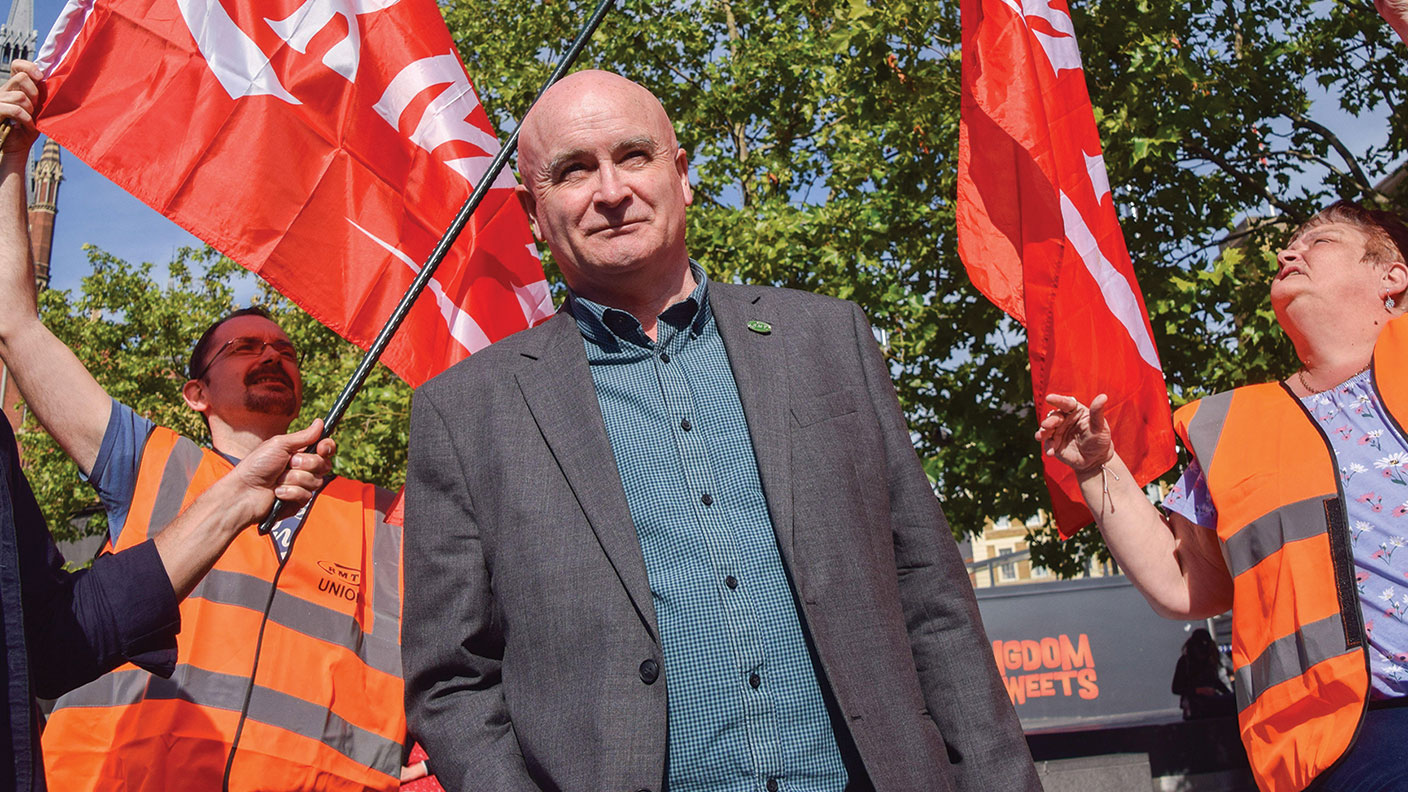Rail strikes and the summer of discontent – who's to blame?
The rail workers are all out and look likely to continue through the summer. Comrades in other unions are joining the strikers. Who is to blame?

Get the latest financial news, insights and expert analysis from our award-winning MoneyWeek team, to help you understand what really matters when it comes to your finances.
You are now subscribed
Your newsletter sign-up was successful
Want to add more newsletters?

Twice daily
MoneyWeek
Get the latest financial news, insights and expert analysis from our award-winning MoneyWeek team, to help you understand what really matters when it comes to your finances.

Four times a week
Look After My Bills
Sign up to our free money-saving newsletter, filled with the latest news and expert advice to help you find the best tips and deals for managing your bills. Start saving today!
What’s the strike about?
Same as most strikes: pay and conditions. The RMT rail union wants a 7.1% pay rise (two points below May’s inflation rate, but reflecting where retail price inflation (RPI) was in December, when the talks began). They also want no compulsory redundancies (there are plans to close large numbers of ticket offices as more tickets are bought online).
Network Rail, which is facing a budget freeze, says any wage increase has to come through cost savings and productivity – a position aligned with the Treasury’s message elsewhere in the public sector. It also wants 1,800 job cuts and to modernise working practices.
RMT boss Mick Lynch, who has the overwhelming backing of the 40,000 railway workers, warned that strikes could continue on and off for the rest of the year if there’s no deal. But compared with the heady days of the 1970s the union’s wishlist is “tame”, says The Economist. “The most militant union in Britain hints that it would accept a deal that kept wages flat after inflation.”
MoneyWeek
Subscribe to MoneyWeek today and get your first six magazine issues absolutely FREE

Sign up to Money Morning
Don't miss the latest investment and personal finances news, market analysis, plus money-saving tips with our free twice-daily newsletter
Don't miss the latest investment and personal finances news, market analysis, plus money-saving tips with our free twice-daily newsletter
By comparison, in a 1972 dispute, when inflation was about 7%, miners demanded a 25% rise – and got it.
Do the strikers have a case?
The RMT has a reputation for intransigence, though Lynch argues that all its opposition to modernisation is simply about protecting workers’ existing terms.
It’s hard to work up much annoyance with the rail unions, says Peter Hitchens in the Daily Mail, given that most of the disruption and chaos I’ve experienced over years of rail travel “has been organised by the rail companies or the government, not by RMT or Aslef militants”. A few days of strikes scarcely compares in “malice, damage or stupidity to the militant, fanatical anti-rail policies followed by Tory and Labour governments for decades”.
And if you think railway workers are greedy, I suggest you look “at the fortunes made by privatised railway companies, while they make the system worse”.
Does the public support it?
For now, the polls suggest it does, says Jeremy Warner in The Daily Telegraph. There is “little sign of gratitude” for the £16bn plus of taxpayers’ money spent bailing out the railways during the pandemic, in a de facto nationalisation.
Meanwhile, Grant Shapps, the transport secretary, is doing himself no favours by seeming to revel in the confrontation with rail workers – all the “better to distract from the government’s growing catalogue of policy blunders”. And his talk of drafting in agency workers was “fatuous” bluster.
But even if you have some sympathy with the strikers, Mick Lynch will soon lose the public if the strikes continue, and ultimately a deal must be done, says Alistair Osborne in The Times.
At root, the dispute is about whether the post-pandemic railways – with passenger numbers still 25% down – can be put on a financially stable footing. If they can’t, there will definitely be fewer jobs for RMT members.
Will the strike work?
To judge by the RMT’s record of success in boosting pay and protecting conditions, the strike may well help the union achieve its goals.
It is “easy to paint the RMT as antiquated and, at times, insane”, says The Economist. It is impossible, however, to argue that the union is ineffective. While other unions (like Unite) mistook size for power, the RMT has remained separate, more agile and better-organised, and relentlessly focused on its members’ interests.
Will they succeed this time? It’s too early to say, says Stephen Bush in the Financial Times. But either way the strike is a “ very big moment in the life of the UK”. Either it will result in a settlement “that will make the UK government’s inflation strategy harder to deliver”, or we will discover that in the age of “working from home”, the impact of a blunt-tool rail strike isn’t what it was.
Will the unrest spread?
There are certainly more strikes to come. Barristers will walk out from next Monday, stopping criminal trials in courts. Wage disputes have halted rubbish collections in some parts of the country, while others have seen late postal deliveries. Teachers and doctors are threatening to strike if the government doesn’t meet their pay demands.
“But the country is not heading back to the 1970s,” says The Guardian. The number of days lost to strikes remains tiny compared with the endemic industrial strife of 50 years ago, and only 24% of workers are union members – half as many as then, and mostly in the public sector.
Can the government handle this?
One bright spot, says The Times, is that our “economically illiterate” prime minister has at least given up his bizarre fantasy – trotted out until a few months ago – that soaring wages were a “post-Brexit benefit”.
He now needs to get a grip on inflation – or face a “summer of discontent”. Alas, it is embarrassingly clear, says The Daily Telegraph, that the Johnson government has no real plan to revive economic growth or to bring down inflation, despite Britain already lagging behind much of the G7, and it is unwilling to do anything practical to stop the unions from bringing the country to a halt.
Instead, the Conservatives have been busy framing the strikes as a “sort of sneak preview of what will happen on Labour’s watch”, says Henry Hill on CapX. This distraction tactic is doomed to failure. “Blaming one’s problems on the preceding Labour government, as the Coalition did, is one thing; blaming them on the next one strains credulity.”
The Tories look like “bystanders”, complaining about strikers – and much else – but failing to take action. If it carries on that way, voters will give them the same answer they gave Ted Heath’s Tories in 1974. Who governs Britain? “Not you”
Get the latest financial news, insights and expert analysis from our award-winning MoneyWeek team, to help you understand what really matters when it comes to your finances.
-
 How a ‘great view’ from your home can boost its value by 35%
How a ‘great view’ from your home can boost its value by 35%A house that comes with a picturesque backdrop could add tens of thousands of pounds to its asking price – but how does each region compare?
-
 What is a care fees annuity and how much does it cost?
What is a care fees annuity and how much does it cost?How we will be cared for in our later years – and how much we are willing to pay for it – are conversations best had as early as possible. One option to cover the cost is a care fees annuity. We look at the pros and cons.
-
 UK wages grow at a record pace
UK wages grow at a record paceThe latest UK wages data will add pressure on the BoE to push interest rates even higher.
-
 Trapped in a time of zombie government
Trapped in a time of zombie governmentIt’s not just companies that are eking out an existence, says Max King. The state is in the twilight zone too.
-
 America is in deep denial over debt
America is in deep denial over debtThe downgrade in America’s credit rating was much criticised by the US government, says Alex Rankine. But was it a long time coming?
-
 UK economy avoids stagnation with surprise growth
UK economy avoids stagnation with surprise growthGross domestic product increased by 0.2% in the second quarter and by 0.5% in June
-
 Bank of England raises interest rates to 5.25%
Bank of England raises interest rates to 5.25%The Bank has hiked rates from 5% to 5.25%, marking the 14th increase in a row. We explain what it means for savers and homeowners - and whether more rate rises are on the horizon
-
 UK inflation remains at 8.7% ‒ what it means for your money
UK inflation remains at 8.7% ‒ what it means for your moneyInflation was unmoved at 8.7% in the 12 months to May. What does this ‘sticky’ rate of inflation mean for your money?
-
 Would a food price cap actually work?
Would a food price cap actually work?Analysis The government is discussing plans to cap the prices of essentials. But could this intervention do more harm than good?
-
 The cost of petrol in the UK compared with the rest of the world
The cost of petrol in the UK compared with the rest of the worldNews The price of petrol in the UK went through the roof last year, but has since settled. We look at how UK petrol price compares with the rest of the world.